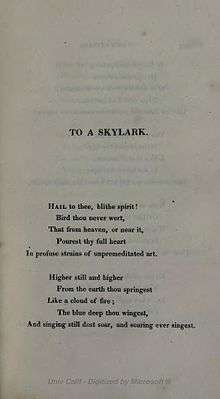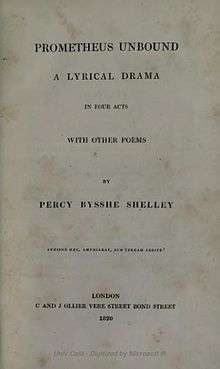To a Skylark



"To a Skylark" is a poem completed by Percy Bysshe Shelley in late June 1820 and published accompanying his lyrical drama Prometheus Unbound by Charles and James Collier in London.[1]
It was inspired by an evening walk in the country near Livorno, Italy, with his wife Mary Shelley, and describes the appearance and song of a skylark they come upon.[2] Mary Shelley described the event that inspired Shelley to write "To a Skylark": "In the Spring we spent a week or two near Leghorn (Livorno) ... It was on a beautiful summer evening while wandering among the lanes whose myrtle hedges were the bowers of the fire-flies, that we heard the carolling of the skylark."
Influence
The 1941 comic play Blithe Spirit by Noël Coward takes its title from the opening line:
- "Hail to thee, blithe Spirit! / Bird thou never wert".
Thomas Hardy wrote the poem "Shelley's Skylark" which referenced the work in 1887 after a trip to Leghorn or Livorno, Italy.[3]
In 1894, music by British composer Arthur Goring Thomas was set to verses from the work in the composition The Swan and the Skylark: Cantata orchestrated by Sir Charles Villiers Stanford.[4]
References
- ↑ Sandy, Mark (21 March 2002). "To a Skylark". The Literary Encyclopedia. Retrieved 2006-01-09.
- ↑ Sandy 2002. Retrieved 2006-01-09.
- ↑ "'Shelley's Skylark', a poem by Thomas Hardy." British Library.
- ↑ The Swan and the Skylark: Cantata by Arthur Goring Thomas, Felicia Dorothea Browne Hemans, John Keats, Percy Bysshe Shelley, Sir Charles Villiers Stanford.
Sources
- Hunter, Parks, C., Jr. "Undercurrents of Anacreontics in Shelley's 'To a Skylark' and 'The Cloud'. Studies in Philology, Vol. 65, No. 4 (Jul. 1968), pp. 677–692.
- Burt, Mary Elizabrth, ed. Poems That Every Child Should Know. BiblioBazaar, 2009. First published in 1904 in New York by Doubleday, Page & Company.
- Cervo, Nathan. "Hopkins' 'The Caged Skylark' and Shelley's 'To a Skylark.'" Explicator, 47.1(1988): 16–20.
- McClelland, Fleming. "Shelley's 'To a Sky-Lark.'" Explicator, 47.1 (1988): 15–16.
- Mahoney, John L. "Teaching 'To a Sky-Lark' in Relation to Shelley's Defense." Hall, Spencer (ed.). Approaches to Teaching Shelley's Poetry. New York: MLA, 1990. 83–85.
- Lewitt, Philip Jay. "Hidden Voices: Bird-Watching in Shelley, Keats, and Whitman." Kyushu American Literature, 28 (1987): 55–63.
- Ulmer, William A. "Some Hidden Want: Aspiration in 'To a Sky-Lark.'" Studies in Romanticism, 23.2 (1984): 245–58.
- Meihuizen, N. "Birds and Bird-Song in Wordsworth, Shelley and Yeats: The Study of a Relationship between Three Poems." English Studies in Africa, 31.1 (1988): 51–63.
- MacEachen, Dougald B. CliffsNotes on Shelley's Poems. 18 July 2011[1]
- SparkNotes Editors. “SparkNote on Shelley’s Poetry.” SparkNotes.com. SparkNotes LLC. 2002. Web. 11 Jul 2011.
- Behrendt, Stephen C. Shelley and His Audiences. University of Nebraska Press: Lincoln and London, 1989.
- O'Neil, Michael. Percy Bysshe Shelley: A Literary Life. The MacMillan Press, Ltd.: London, 1989.
- Tomalin, Claire. Shelley and His World. Thames and Hudson, Ltd.: London, 1980.
- White, Ivey Newman. Portrait of Shelley. Alfred A. Knopf, Inc.: New York, 1945.
- Zillman, Lawrence John. Shelley's Prometheus Unbound. University of Washington Press: Seattle, 1959.
External links
| Wikisource has original text related to this article: |
- Audiorecording of "To a Skylark" read by Kara Shallenberg on LibriVox, track 64, from Poems Every Child Should Know (1904), Mary E. Burt, ed.
- Online version on Bartleby.com.
- Shelley's Skylark: A Facsimile of the Original Manuscript. Cambridge, MA: Library of Harvard University, 1888.
- ↑ "Literature Notes - Homework Help - Study Guides - Test Prep - CliffsNotes". Retrieved 23 September 2014.
